Submitted by Drs. Qihong Huang and X. Sherwin Yan
On October 15-18, 2017, the 8th Chinese Society of Toxicology conference (CSOT/VIII) was held in Jinan, Shandong, China. More than 1700 scientists attended the conference, making it an unprecedented gathering of Toxicologists in China.
Prof. Pingkun Zhou, President of CSOT, delivered the keynote speech. He reviewed the history of Toxicological Sciences over the century and looked ahead the bright future of the discipline.
A delegation of ten experts from Association of Chinese in Toxicology (AACT) was honored to participate in the CSOT conference. Six delegates held a dedicated platform session on Nonclinical Safety Assessment Strategy in Support of Development of Advanced Therapy. The speakers were Dr. Alex Xu from China FDA (CFDA), Dr. Yi Jin from WuXi AppTec, Dr. Matt Liu from Regeneron, Dr. Ting Su from Bristol Myers Squibb, Dr. Qihong Huang from Boehringer Ingelheim and Dr. Robert Li from Genentech. The session was chaired by Dr. Alex Xu and Dr. Robert Li. The session covered a wide variety of topics on the Development of Advanced Therapy, representing the most state-of-the-art thinking and approaches in safety assessment in the pharmaceutical industry. The session was highly attended and all the talks were well received.
Dr. X. Sherwin Yan from Honeywell International gave a speech in the Section of “Risk Assessment for Pesticides, Cosmetics and New Chemicals”. In his presentation, Dr. Yan provided an empirical and multi-tier approach to the human exposure and health risk evaluation of emissions that involves hundreds of substances from fragranced consumer products. Dr. Pan Chen from Albert Einstein College of Medicine attended the Section of “Neurotoxicology of Heavy Metals and POPs”. In his presentation, Dr. Chen elucidated the novel role for HPO-9/BTBD9, a restless legs syndrome associated protein, in regulating Mn homeostasis and dopamine signaling through the insulin-like growth factor (IGF) signaling pathway in C. elegans. Dr. Zhibin Wang from Johns Hopkins University, presented in the Section of “The Current Research Status and Future of Genetic Toxicology”. In his presentation, Dr. Wang discussed two approaches to identify unknown imprinted genes in exploring the mechanism of regional “autosomal chromosome inactivation” in human development and public health. These presentations represented the leading scientific research and applied approaches in their respective area using the world-class technologies in promoting toxicology in human health evaluation. The topics were up-to-date, the propositions were pioneering, and the approaches were world-class. All sections were highly attended and positive feedback received from the audience in each section.
Following the CSOT, four of us were invited to CFDA Center for Drug Evaluation (CDE) in Beijing, where we were welcomed by Dr. Alex Xu (Center Chief Scientist in Pharmacology and Toxicology), Dr. Qingli Wang (Director, Department of Pharmacology and Toxicology) and Dr. Haixue Wang (Deputy Director, Department of Pharmacology and Toxicology) and many pharmacology and toxicology reviewers. The topics of the presentations were Complexities in the preclinical development of antibody drug conjugates by Dr. Matt Liu, Toxicology Issue Resolution by Dr.Ting Su, Nonclinical Safety Assessment of Intravitreal Biologics by Dr. Qihong Huang, and Biological Advances to Help Negate the Nonclinical Safety Assessment Strategy in Cancer Immunotherapy by Dr. Robert Li. Dr. Alex Xu also gave a presentation about Challenges on Nonclinical Safety Evaluation of Biologics and Considerations from the Regulatory Perspective. The wonderful presentations drew a great deal of interest and sparked a live discussion between the speakers and the reviewers.
Our delegation to China has come to a successful conclusion. It was a wonderful and memorable journey to each member of the delegation. This trip not only played a major role in promoting scientific communication on medical research, chemical risk assessment, and safety assessment of pharmaceuticals, it also had a far-reaching impact on creating a safer and healthier environment. We all felt truly honored to be part of the AACT delegation participating in the 8th Chinese Society of Toxicology conference (CSOT/VIII). AACT received generous support from SOT through Global Initiatives Funding (GIF). We are truly grateful for the support that made the trip possible.
